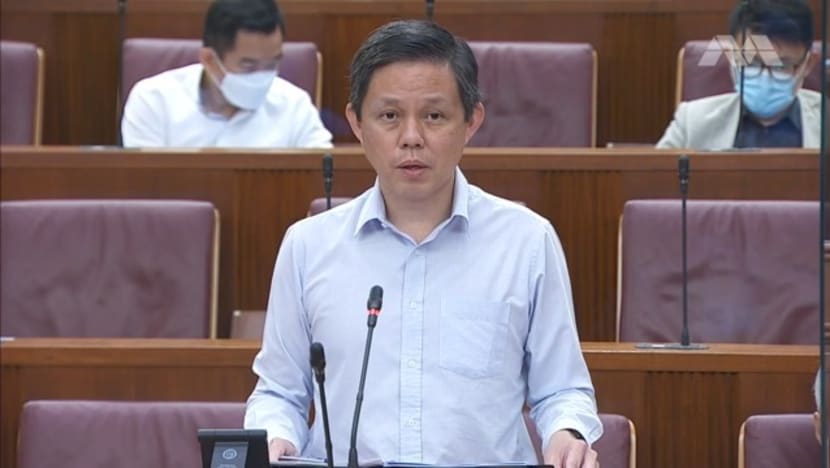Workload for teachers ‘more than doubled’ during COVID-19 pandemic: Chan Chun Sing

SINGAPORE: The workload of teachers has “more than doubled” to keep the school system going during the COVID-19 pandemic, said Minister for Education Chan Chun Sing on Tuesday (Nov 2).
Speaking in Parliament, Mr Chan was responding to a supplementary question from Member of Parliament (MP) Patrick Tay (PAP-Pioneer) about further concrete steps that the Ministry of Education (MOE) could take to reduce pressures “from various stakeholders” on educators.
“I think we should all thank our teachers and educators, because over the last two years, it has really been very tough on them,” said the Education MInister.
“Not many of us realise that in order to keep our school system going, the workload for teachers has more than doubled.”
To switch seamlessly from in-person lessons to home-based learning, teachers need to spend “a lot of time” preparing more than two sets of lesson plans, he noted.
They also need to take care of students with higher needs, including those who need to return to school during home-based learning.
“On top of all this, the school leaders and teachers also have to perform the role of contact tracing teams in case there are cases in the school. And we have to do this without additional manpower support,” he added.
If teachers are “not well taken care of” and “not in the best of conditions”, it is “very difficult” to expect them to take good care of the students, said Mr Chan.
About 80 school staff sought support from MOE’s in-house counsellors in 2020, an increase from the annual average of 50 before the COVID-19 pandemic, he added.
The number of teaching staff from institutes of higher learning seeking counselling support has also increased, said Mr Chan.
MOE does not have “more detailed data” as information from the counselling sessions are kept confidential, and staff are not required to report mental distress or psychiatric issues, he added.
MOE MEASURES TO REDUCE WORKLOAD
The Education Ministry has adjusted various programmes in the short term to lighten the workload of teachers, said Mr Chan.
For example, MOE has “re-prioritised initiatives” and reduced schools’ involvement in the work from its headquarters and pilot programmes, said the Education Minister.
“Schools have also been given greater flexibility to pace the implementation of selected initiatives, including deferring implementation if this helps to spread out staff workload,” he added.
This includes allowing secondary schools and JCs the option to defer the implementation of blended learning to 2022, instead of Term 3 of 2021 as originally planned, said Mr Chan.
“At the school level, we recognise that ground practices may vary. We have called on school leaders to re-prioritise school programmes, establish clear expectations on teachers’ availability and work hours, and encourage supervisors to check in with their officers regularly,” said the Education Minister.
School leaders have been “providing guidance” to teachers on avoiding parent-staff communication after school operating hours except for urgent matters like student safety and well-being, he noted.
“This can minimise the blurring of lines between work and personal time,” said Mr Chan.
“In line with the streamlined health protocols, ringfencing policies and contact tracing processes in schools have now also been significantly simplified and teachers’ workload related to COVID-19 management is being reduced.”
In the longer term, MOE needs to “do much more” to help teachers cope. This could include using technology to scale up teaching resources so that teachers can apply their time more strategically to students who need the most help, said Mr Chan.
“I also would like to see our teachers systematically given a break or sabbatical, whereby they can go out and recharge themselves. Not just to recharge themselves, but also for them to acquire new perspectives, new skills, new connections to bring back to the school,” he added.
“That is my wish over the long term. And we will progressively roll this out.”
SUPPORTING TEACHERS AS A SOCIETY
Mr Chan urged parents and the rest of society to partner teachers to support students.
“Let me say this, I think our teachers work very hard. They care a lot for our students, and I don’t think our teachers are afraid to work hard,” said the Education Minister.
“But in working hard, they must be given a sense of agency, that they are in control, that they are doing things with conviction, and that it is important.”
Noting that many teachers even give their handphone numbers to students in case they get into trouble outside of school hours, Mr Chan said he has heard of many stories of students calling teachers in the middle of the night because they were kicked out of the house due to family issues.
“And our teachers respond. This is the extent to which our teachers go to to take care of their students beyond the curriculum time in school. But in giving out their handphone number to the families and the students, we also hope that the families would not abuse the trust,” said the Education Minister.
“It is one thing for a child to call up the teacher at midnight to say that he’s in trouble. It is another thing for the parent to call up the teacher at midnight to ask whether the child has spelling, and should wear a red or blue t-shirt.”
If the child forgets about these things, it is part of their learning experience, Mr Chan stressed.
“As parents, don’t need to overly protect our child and children and deprive them of the learning experience.
“I think we need to establish this clear understanding of expectations of parents and society,” he said, adding that a lot of these expectations are also projected on teachers.














